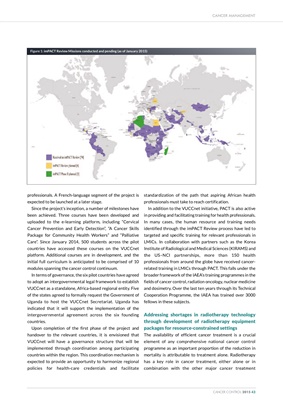
professionals. A French-language segment of the project is
expected to be launched at a later stage.
Since the project's inception, a number of milestones have
been achieved. Three courses have been developed and
uploaded to the e-learning platform, including "Cervical
Cancer Prevention and Early Detection", "A Cancer Skills
Package for Community Health Workers" and "Palliative
Care". Since January 2014, 500 students across the pilot
countries have accessed these courses on the VUCCnet
platform. Additional courses are in development, and the
initial full curriculum is anticipated to be comprised of 10
modules spanning the cancer control continuum.
In terms of governance, the six pilot countries have agreed
to adopt an intergovernmental legal framework to establish
VUCCnet as a standalone, Africa-based regional entity. Five
of the states agreed to formally request the Government of
Uganda to host the VUCCnet Secretariat. Uganda has
indicated that it will support the implementation of the
intergovernmental agreement across the six founding
countries.
Upon completion of the first phase of the project and
handover to the relevant countries, it is envisioned that
VUCCnet will have a governance structure that will be
implemented through coordination among participating
countries within the region. This coordination mechanism is
expected to provide an opportunity to harmonize regional
policies for health-care credentials and facilitate
standardization of the path that aspiring African health
professionals must take to reach certification.
In addition to the VUCCnet initiative, PACT is also active
in providing and facilitating training for health professionals.
In many cases, the human resource and training needs
identified through the imPACT Review process have led to
targeted and specific training for relevant professionals in
LMICs. In collaboration with partners such as the Korea
Institute of Radiological and Medical Sciences (KIRAMS) and
the US-NCI partnerships, more than 150 health
professionals from around the globe have received cancerrelated
training in LMICs through PACT. This falls under the
broader framework of the IAEA's training programmes in the
fields of cancer control, radiation oncology, nuclear medicine
and dosimetry. Over the last ten years through its Technical
Cooperation Programme, the IAEA has trained over 3000
fellows in these subjects.
Addressing shortages in radiotherapy technology
through development of radiotherapy equipment
packages for resource-constrained settings
The availability of efficient cancer treatment is a crucial
element of any comprehensive national cancer control
programme as an important proportion of the reduction in
mortality is attributable to treatment alone. Radiotherapy
has a key role in cancer treatment, either alone or in
combination with the other major cancer treatment
CANCER MANAGEMENT
CANCER CONTROL 2015 43
Figure 1: imPACT Review Missions conducted and pending (as of January 2015)